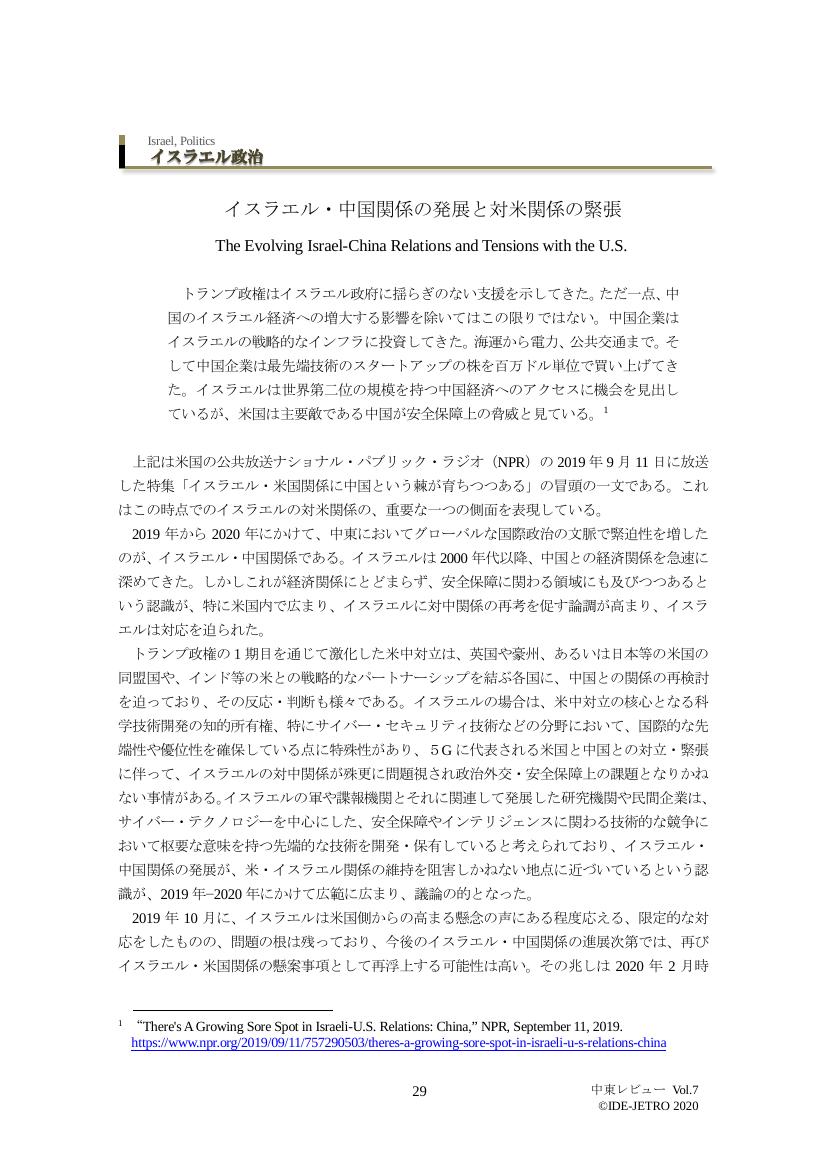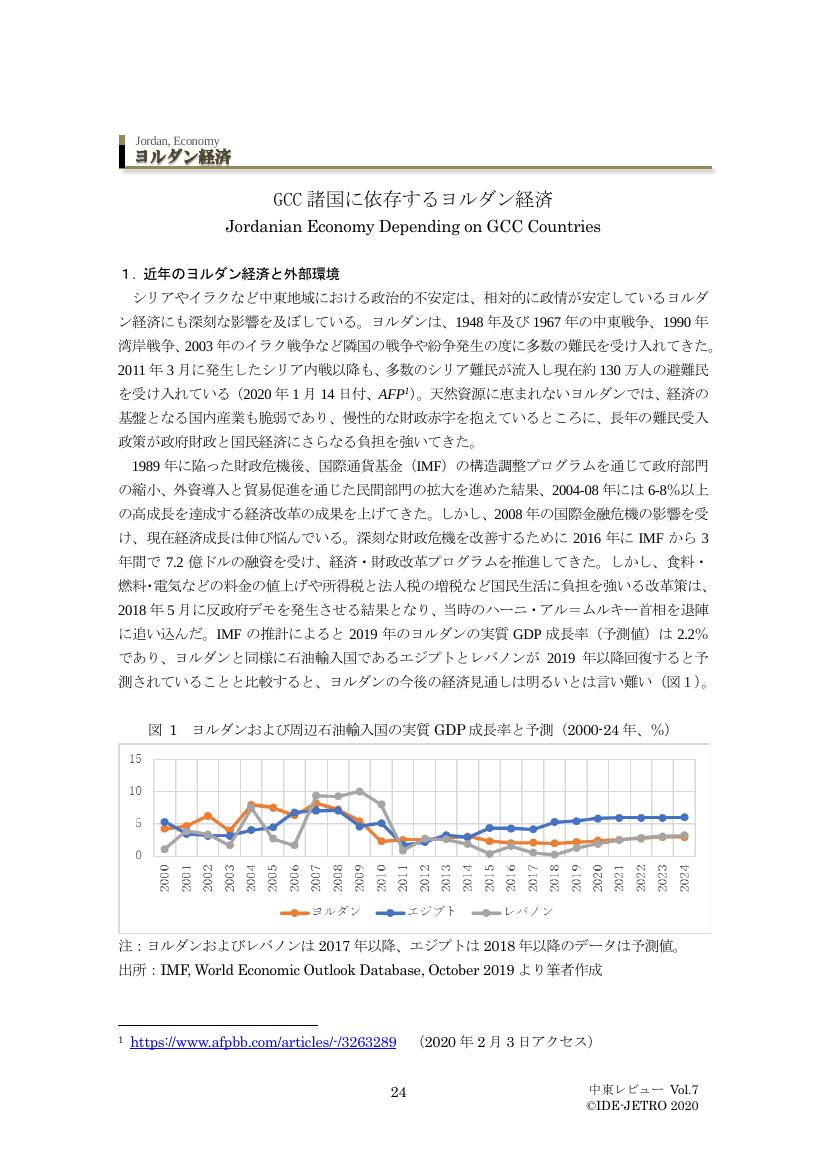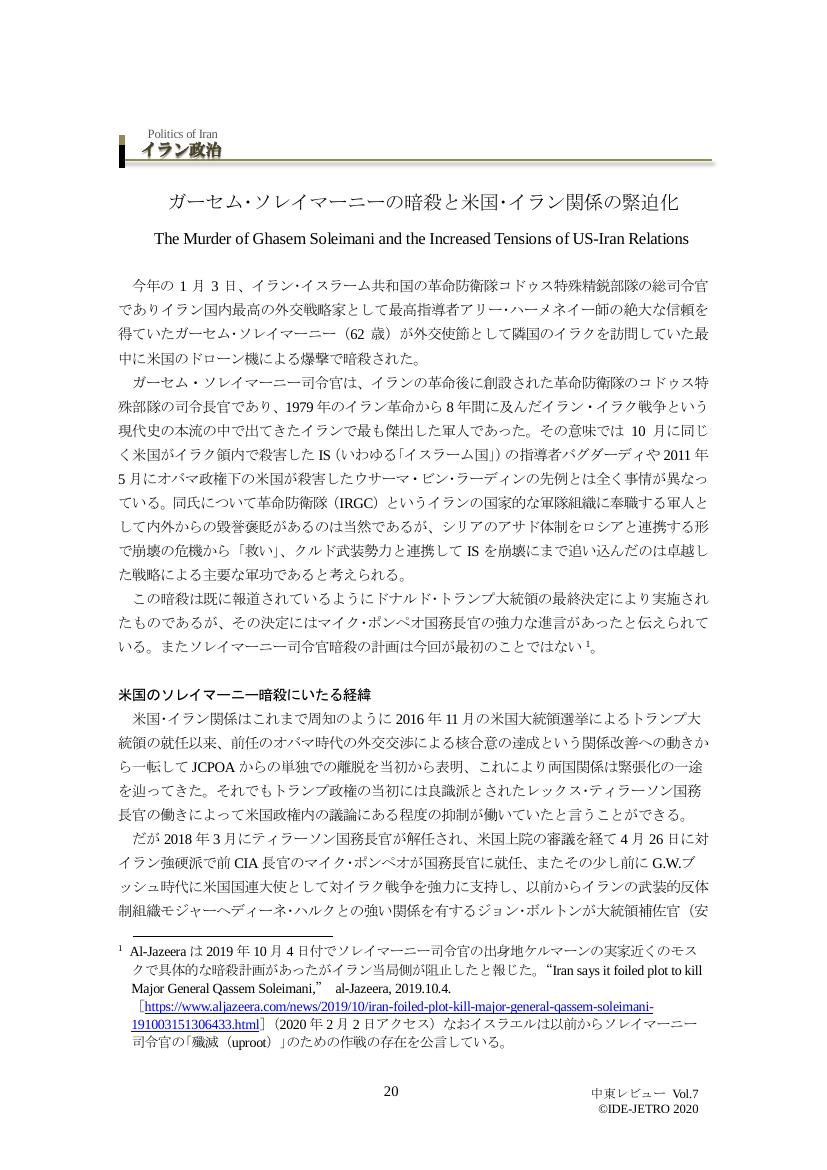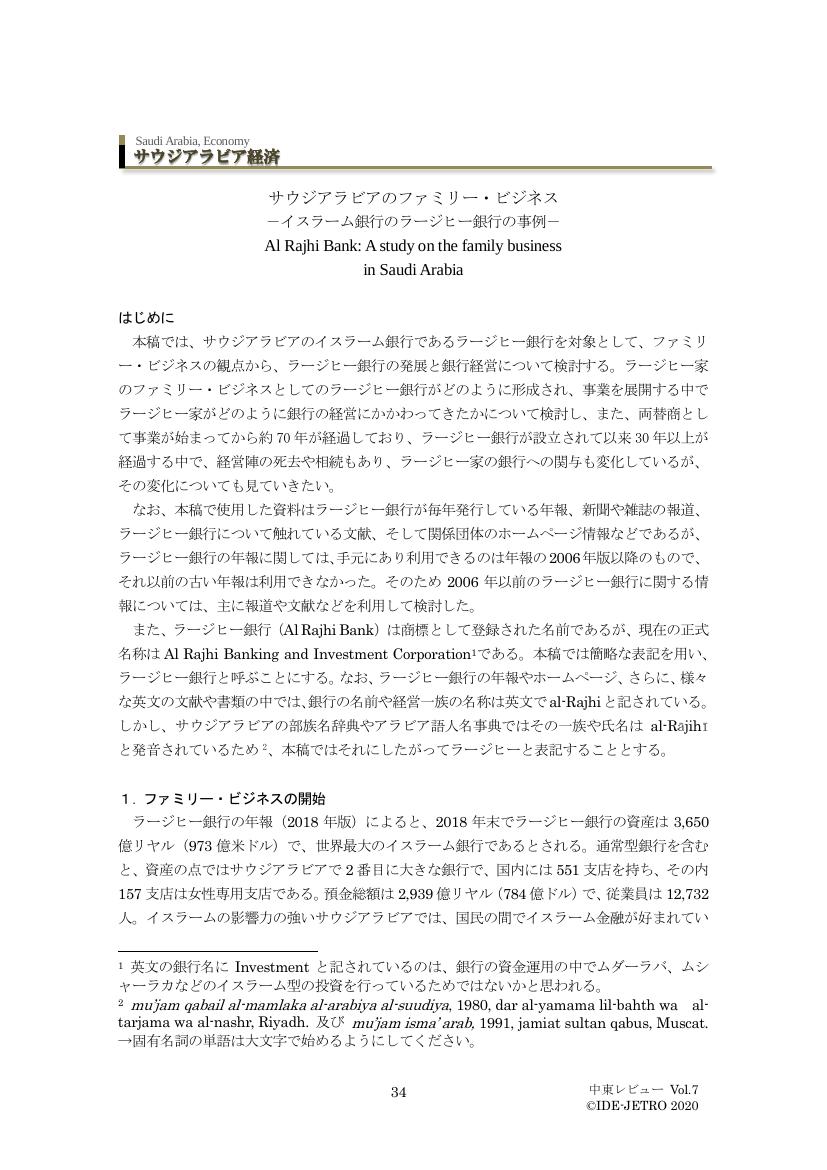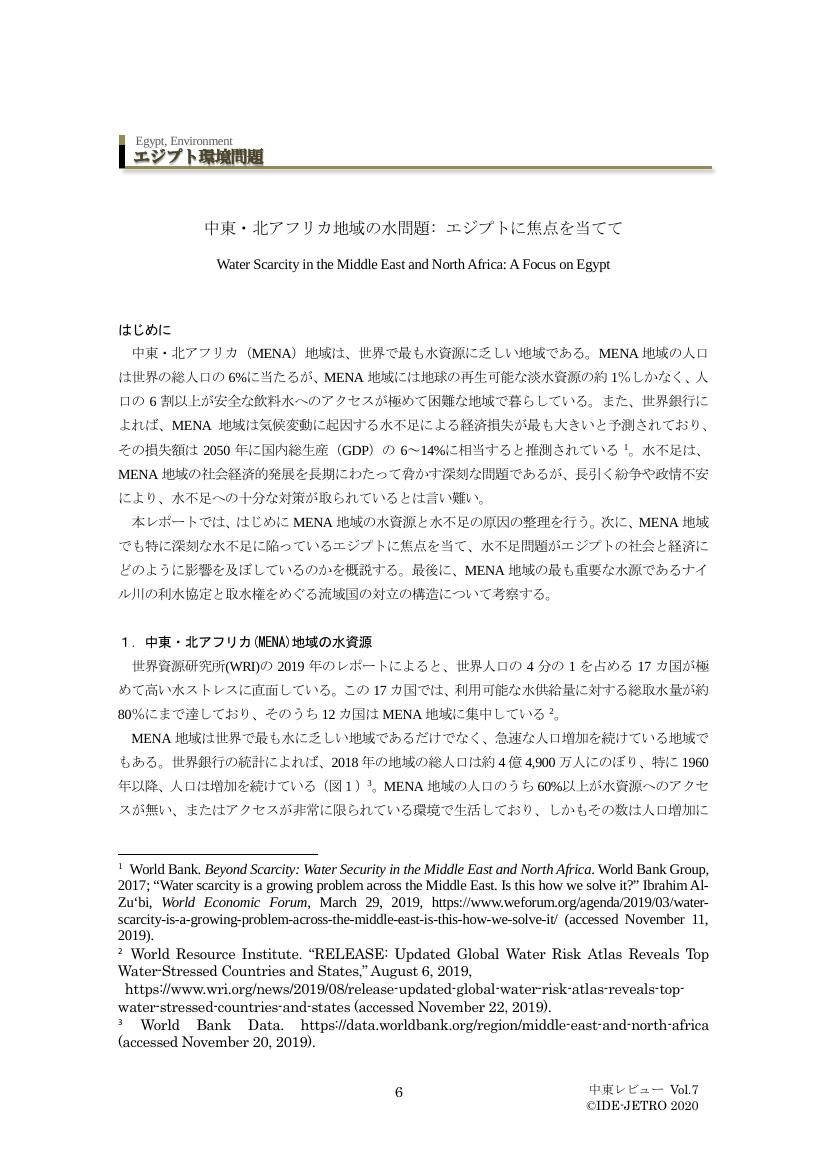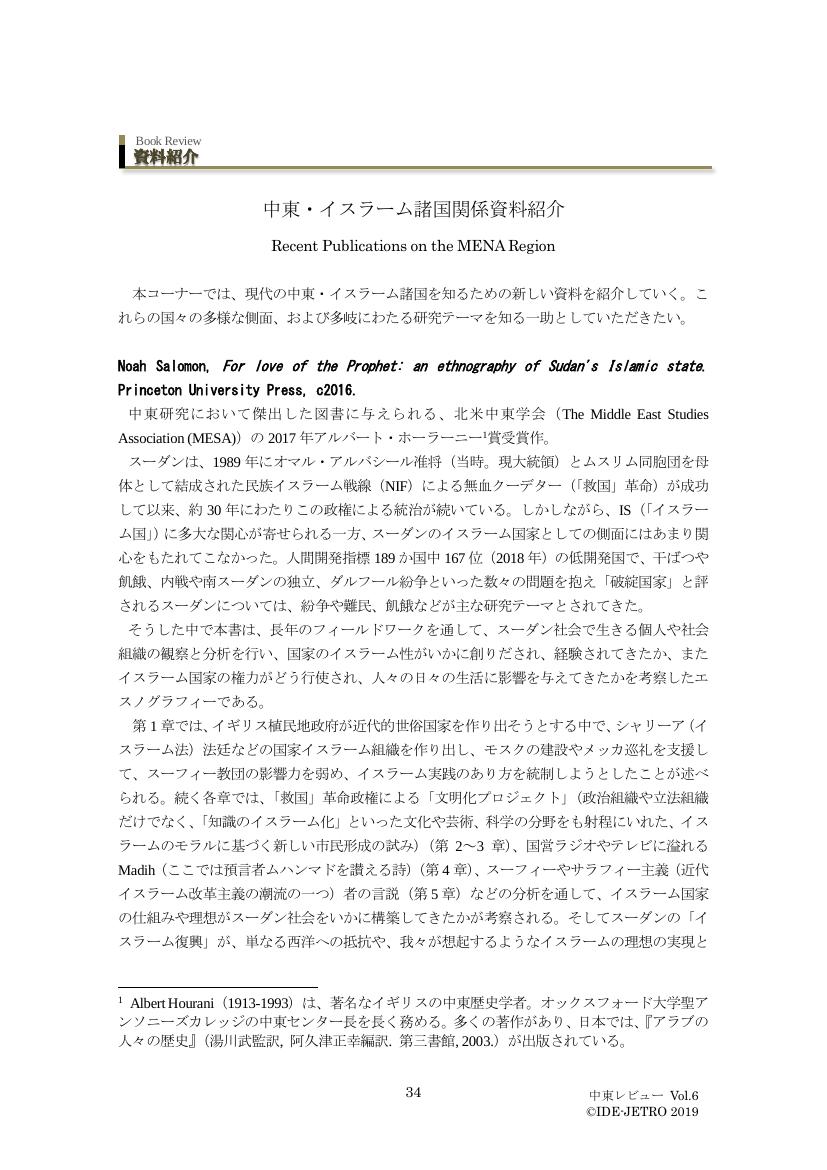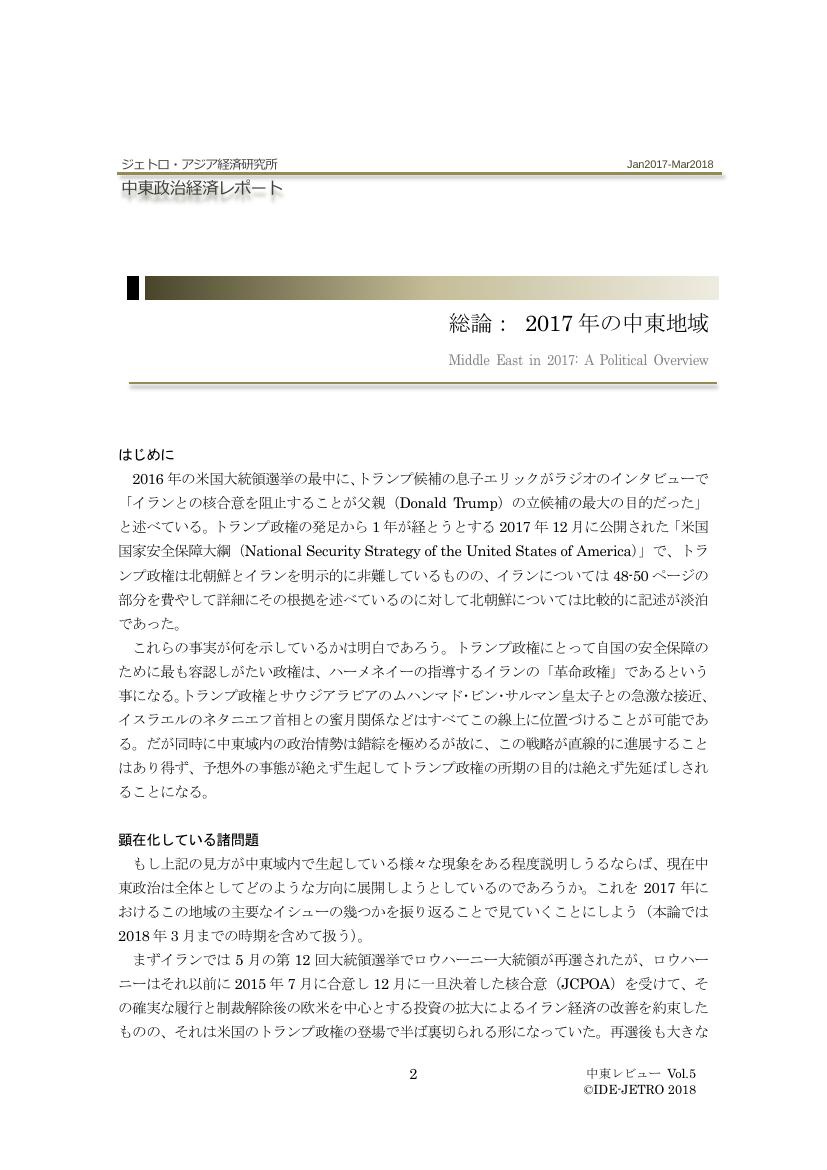149 0 0 0 OA インド・モディ政権と対中東政策
- 著者
- 清水 学
- 出版者
- 独立行政法人 日本貿易振興機構アジア経済研究所
- 雑誌
- 中東レビュー (ISSN:21884595)
- 巻号頁・発行日
- vol.7, pp.115-137, 2020 (Released:2020-03-27)
India’s status in the world has been elevated since the beginning of this century, supported by its accelerated economic growth. In order to grow from a regional to world power, the foreign policy of a nation needs to be adapted to the new circumstances. In this context, the new relations between India and the Middle East attract our attention. We must also consider the repercussions of domestic politics on the subject, particularly since the advent of the BJP government under Narendra Modi in 2014.Ever since the BJP government came to power in 2014, India has begun to question the assumptions of political principles such as “secularism,” established under the Congress party government since the country’s independence in 1947. The new orientations could be termed as a paradigm change or a watershed in the political framework in the history of independent India. In the domestic field, the BJP government challenges the Indian “secularism” and pursues a sort of “ethnic democracy,” a concept introduced in Israel. Concerning its foreign policies India is gradually discarding its use of the traditional non-alignment principle and pursues a combination of multiple alliances taking into account the rising influence of China.The ruling party, BJP, is the political wing of the RSS, an influential Hindu right-wing ss organization promoting Hinduism as the national identity of the Indian nation. The BJP and RSS particularly target the Muslim community in their campaign to promote “Hindutva,” a Hinduized national integration concept. The Indian “secularism” traditionally emphasizes equal consideration of every religious community in India. However, the Modi government in 2019 annulled the constitutional clauses that guaranteed special allowances to the Jammu and Kashmir state with Muslim majority and introduced an amendment to the citizenship law which excluded Muslims while considering granting citizenship to illegal refugees.Under these circumstances, the Modi government pursues three different policies toward the Middle East. The first policy is to promote trade and investment, primarily from the viewpoint of mutual economic interests. India’s dealings with the Gulf countries and East Africa are typical cases where the Modi government employs this policy. The second policy is to enhance India’s regional dominance and neutralize any interventions from neighboring Muslim countries in India’s domestic policies concerning the Muslim citizens in the country. The third policy is a newly emerged special relationship with Israel, which has strategic, technological, and ideological implications in the reorganization of power structure in the South West Asia.
125 0 0 0 OA イスラエル・中国関係の発展と対米関係の緊張
- 著者
- 池内 恵
- 出版者
- 独立行政法人 日本貿易振興機構アジア経済研究所
- 雑誌
- 中東レビュー (ISSN:21884595)
- 巻号頁・発行日
- vol.7, pp.29-33, 2020 (Released:2020-03-27)
101 0 0 0 OA アゼルバイジャン外交と非同盟主義―イランとイスラエルの狭間―
- 著者
- 清水 学
- 出版者
- 独立行政法人 日本貿易振興機構アジア経済研究所
- 雑誌
- 中東レビュー (ISSN:21884595)
- 巻号頁・発行日
- vol.6, pp.99-119, 2019 (Released:2019-05-30)
Azerbaijan, a land locked country in South Caucasia, gained independence in 1991 after the break-up of the USSR. It is surrounded by Russia, Iran, Armenia, Georgia, and Turkey and is compelled to depend on a balancing act in its diplomacy to protect its sovereignty and survive. In April 2018, it reiterated its intention to host the 2019 Summit of the Non-Aligned Movement (NAM) in Baku and take on the position of chairmanship of NAM for a 3-year term. It is to be noted that Azerbaijan took this decision at a time of heightened tensions in the region when the US unilaterally withdrew from the Joint Comprehensive Plan of Action, popularly known as the Iran nuclear deal. Azerbaijan has a border with northwestern Iran and has had a complicated relationship with it based on historical, ethnic, and religious ties. At the same time, Azerbaijan is the major supplier of oil to Israel, which is increasingly antagonistic to Iran. For the last decade, Israel and Iran have tried to gain Azerbaijan’s favor by offering arms or adjusting their diplomatic stance to take into account the geopolitical importance of Azerbaijan. Iran switched from its tacit support to Armenia on the Nagorno Karabakh conflict to a more sympathetic understanding of Azerbaijan’s position.The Nagorno Karabakh issue has been the focal point of security and sovereignty for Azerbaijan, which claims that Nagorno Karabakh and its neighboring areas have been occupied illegally by Armenia. Since the latter half of 2018, Israel has raised the level of military cooperation with Azerbaijan by supplying more advanced arms, such as drones, while Iran strengthened its military links with Azerbaijan by enhancing its military contacts and cooperation. For Azerbaijan, the simultaneous deepening of military cooperation with the two influential and mutually antagonistic regional powers—Israel and Iran—is not inconsistent because it seeks to upgrade its own military capacity.The NAM has not been given serious attention in the world politics since the end of the cold war. At the same time, the objective reality that the number of member states has increased cannot be denied. The purpose and definition of the NAM is still vague and allows member states to arrive at different versions of its objectives. The mediating capacity of the NAM to solve conflicts among the member states is, at best, marginal. However, the NAM is a forum where the participants—most of whom experienced colonial rule—can express strong or mild dissatisfaction with the present world regime, dominated by the West. In this sense, the role of NAM could be still flexible and effective under certain conditions in the fluid world political system. Azerbaijan utilizes the NAM to achieve a balance in its diplomatic relations in the present turbulent situation and strengthen its political position on the Nagorno Karabakh issue.
53 0 0 0 OA トランプ政権の発足とイラン・米国関係の今後
- 著者
- 鈴木 均
- 出版者
- 独立行政法人 日本貿易振興機構アジア経済研究所
- 雑誌
- 中東レビュー (ISSN:21884595)
- 巻号頁・発行日
- vol.4, pp.35-41, 2017 (Released:2019-11-12)
The result of the November election of the US president has crucial importance for the future of several countries including Israel, Saudi Arabia, and Iran, with different nuances pertaining to each country. In the case of Iran, contrary to the other two countries, the result of Donald Trump’s victory is disgusting, as he has openly denied the profits of the Joint Comprehensive Plan of Action (JCPOA) from the outset of his election campaign.If Hillary Clinton were elected, she would have followed Barack Obama’s political legacy in many ways, including the policies that brought about his breakthrough in US–Iranian relations after the 1979 revolution. We could refer to many pieces of evidence, especially from M. Landler’s convincing work entitled Alter Egos (2016). President Obama’s unprecedented challenge in this regard was to change relations with Iran such that there is less emnity. Nowadays it seems very difficult to expect that this rare historical chance at a stronger US-Iran relationship will eventually materialize.In this very difficult situation, Japan should not hesitate to make every effort to convince the Trump Administration that it is crucial for the US to maintain diplomatic relations with Iran to keep the Middle East from entering a more catastrophic situation characterised by greater warfare. Japan is an important player in this situation given its uniqueness in having an alliance with the US while at the same time being trusted by Iran.
36 0 0 0 OA 湾岸地域でのアメリカ軍の縮小とイラン戦力の拡充 ―サウジアラビアの安全保障をめぐって―
- 著者
- 福田 安志
- 出版者
- 独立行政法人 日本貿易振興機構アジア経済研究所
- 雑誌
- 中東レビュー (ISSN:21884595)
- 巻号頁・発行日
- pp.Vol.7_J-Art01, (Released:2019-07-30)
From the beginning of the Trump administration, the U.S. military presence in Gulf Cooperation Council (GCC) countries has rapidly evolved. Specifically, the number of U.S. Air Force soldiers stationed in Qatar, United Arab Emirates, and Kuwait has been significantly reduced. This may be a result of President Trump’s preference to minimize the level of U.S. troops deployed in the region. Conversely, the United States has maintained its naval presence in the gulf, including an aircraft carrier strike group and naval troops in Bahrain. In the same period, Iran has remarkably expanded its military capabilities after developing sophisticated new missile systems, drones, and submarines. Combined with recent hostile events in the gulf, this situation has heightened concerns about gulf security, in particular, to ensure the safe passage of crude oil destined for all parts of the world. Current tension may lead to an escalated presence of U.S. forces in the region.
12 0 0 0 OA 【イスラエル政治】「ユダヤ人国家」の二律背反(ディレンマ):相克する民族主義と民主主義1
- 著者
- 池田 明史
- 出版者
- 独立行政法人 日本貿易振興機構アジア経済研究所
- 雑誌
- 中東レビュー (ISSN:21884595)
- 巻号頁・発行日
- vol.6, pp.17-22, 2019 (Released:2019-05-30)
10 0 0 0 OA 出光石油協定に見る1950年代のイランと日本のエネルギー外交
- 著者
- ケイワン アブドリ
- 出版者
- 独立行政法人 日本貿易振興機構アジア経済研究所
- 雑誌
- 中東レビュー (ISSN:21884595)
- 巻号頁・発行日
- vol.5, pp.152-160, 2018 (Released:2019-03-15)
During the Oil Nationalization Movement of the early 1950s, Iran’s oil was boycotted by the British and major oil companies, which brought a lot of financial hardship to the government of Prime Minister Mossadegh. A few medium-scale oil companies tried to buy and transport it to the market, including Japanese Idemitsu Kosan. It was a very risky but highly profitable deal for them, because Iran gave large discounts to the buyers. However, after Mossadegh’s downfall and the establishment of the Zahedi government, the deal faced problems. Iran could not or would not easily accept the discounted rate requested by Idemitsu.In approximately 1954, the Japanese government intervened to support Idemitsu, including by writing letters to the Foreign Ministry. Below is one of those letters, which has been translated from Farsi to Japanese, that was sent to Dr. Ardalan, the Foreign Minister of Iran, in September 1956. In the letter, Japan demanded that the Iranians keep their obligations and promises and offered a long-term oil deal with special conditions. In the article, I describe the background and details of the deal, explain the Japanese government’s position regarding the Idemitsu deal, and shed some light on Japan’s energy diplomacy.
6 0 0 0 OA 「中東」の後で:地域再編のなかのトルコ・イラン関係
- 著者
- Arshin Adib-Moghaddam
- 出版者
- 独立行政法人 日本貿易振興機構アジア経済研究所
- 雑誌
- 中東レビュー (ISSN:21884595)
- 巻号頁・発行日
- vol.6, pp.75-81, 2019 (Released:2019-05-30)
20世紀の初頭から欧米の主導で発明され、機能してきた「中東」の地域概念はもはや存在していない。同様に旧オスマン帝国の領域を指す「近東」概念もその有効性をすでに完全に喪失した。現在では「西アジアおよび北アフリカ」地域と呼ぶべき同地域において、(1)米国の影響が度重なる失政によってますます周辺化していること、(2)その間隙を埋める域外大国としてロシアと中国が急速に台頭していること、(3)域内の主要な外交アクターとしてイランとトルコが影響力を強めていること、以上の3つの顕著な傾向を指摘することができる。こうした前提でトルコ・イラン関係をみる時、両国関係が地域的な安定にもたらす影響はどのようなものだろうか。その場合両国間の歴史的な長いライバル関係や対立関係にもかかわらず、20世紀以降の時代における両国関係は比較的良好なままに推移してきた。1979年のイラン革命直後の一時期はその例外であって、この時期には世俗主義的なケマル主義との齟齬が前面に出ていた。近年においてイラン・トルコ関係が大きく変化したのはトルコの親イスラーム政党である公正発展党(AKP)の2002年における躍進以降である。1996年に政権に就いた後、イランとの大幅な接近を試みたものの政権基盤が比較的脆弱だったエルバカン首相時代から、AKPの政権運営の下で軍部など世俗エリート層との抗争を経て、さらにエルドアン大統領のもと権力の集中が進むと、両国関係の深化は経済関係から安全保障分野までに広く及ぶ新たな段階を迎えるに至った。本論稿では以上の展開を近年の対クルディスタン問題やシリア問題、対米関係およびトルコのNATO加入などの文脈で具体的に検証し、最後に結論部で「アラブの春」以降の地域再編のなかで両国間の互恵に基づく広範な連携関係が積極的に果たしうる役割について展望する。(文責・鈴木均)
4 0 0 0 OA イスラエル経済:グローバル化と「起業国家」 第Ⅱ部:産業政策とイノベーション
- 著者
- 清水 学
- 出版者
- 独立行政法人 日本貿易振興機構アジア経済研究所
- 雑誌
- 中東レビュー (ISSN:21884595)
- 巻号頁・発行日
- vol.5, pp.134-151, 2018 (Released:2019-03-15)
Since the 1990s, Israel’s industrial development has entered a new phase owing to active engagement in Information and Communications Technology- related ventures. In the first decade of the 21st century, Israel succeeded in presenting her image as a “startup” nation, attracting worldwide attention. Israel’s economy, which was highly industrialized, tried to adapt itself to economic and financial globalization. In 2010, Israel was accepted as a full member of the Organisation for Economic Co-operation and Development. The collapse of Lehman Brothers in September 2008 brought to the fore not only the instability of the global financial system as a whole but also the latent weak potential of economic growth, especially in developed countries that lacked innovative, leading industries. In this framework, microlevel initiatives in Israel carried out using active venture capital to explore new niches and new, innovative, high-tech fields attracted the attention of various countries. These fields include the wider areas of software development in ICT—such as big data analysis, cyber security, nanotechnology, artificial intelligence, and the Internet of Things—in addition to biotechnology and the pharmaceutical industry. It is important to note that Israeli industrial development has been influenced not only by economic necessity but also by national security needs. This latter priority guided the selection and concentration of resources within Israel’s limited national budget and investment capacity.Academic research and development also contributed to improvement in the technological aspect of the military industry. Technological know-how spillover from the military industry contributed to some extent to an emerging, domestic, microlevel high-tech industry. The military operations engaged in by the Israel Defense Forces in conflict zones in the Middle East, including operations in occupied territories, provided an opportunity to enhance the quality and practicability of weapons produced. The increasing volume of military grants from the US also supported the military industry in overcoming difficult financial phases. Therefore, Israel’s model of a “start-up” nation is not applicable directly to other nations, as the model was not neutral, owing to the state’s guidance and intervention on security issues. Although the new neoliberal macroeconomic circumstance is favorable to the “start-up” of new ventures, the indirect support by the state through various policies also contributed to the building of a positive environment for them. New markets for Israeli weapons and high-tech gadgets such as drones are expanding rapidly, particularly in huge emerging markets such as India and China. Although the export potential of military equipment is immense, it obliges Israel to be involved in delicate and complex international political relations among the importing countries. This is a new challenge in this unstable and risky world, as high-tech and military equipment always bears political implications beyond economic interests.
3 0 0 0 OA GCC諸国に依存するヨルダン経済
- 著者
- 齋藤 純
- 出版者
- 独立行政法人 日本貿易振興機構アジア経済研究所
- 雑誌
- 中東レビュー (ISSN:21884595)
- 巻号頁・発行日
- vol.7, pp.24-28, 2020 (Released:2020-03-27)
3 0 0 0 OA ガーセム・ソレイマーニーの暗殺と米国・イラン関係の緊迫化
- 著者
- 鈴木 均
- 出版者
- 独立行政法人 日本貿易振興機構アジア経済研究所
- 雑誌
- 中東レビュー (ISSN:21884595)
- 巻号頁・発行日
- vol.7, pp.20-23, 2020 (Released:2020-03-27)
3 0 0 0 OA エジプトの社会保障改革
- 著者
- 土屋 一樹
- 出版者
- 独立行政法人 日本貿易振興機構アジア経済研究所
- 雑誌
- 中東レビュー (ISSN:21884595)
- 巻号頁・発行日
- pp.Vol.7_J-Art02, (Released:2019-09-21)
- 参考文献数
- 26
Although Egypt’s social security system became obsolete in the 1990s, it was the Sisi administration that launched the major reform. The social security system was restructured along with the implementation of the bold macro-economic reform. As a result, the new social security plan can cover a much bigger population than what the old system could, despite a chronic fiscal deficit. The purpose of this paper is to examine the state of the social security reform in Egypt since 2014 and discuss its sustainability. The paper reviews the developments of the new cash transfer programs as well as the rebuilding of the social insurance system. While the new social security scheme is well-designed and is highly reputed, administrative capabilities will be a major challenge.
2 0 0 0 OA サウジアラビアのファミリー・ビジネス -イスラーム銀行のラージヒー銀行の事例-
- 著者
- 福田 安志
- 出版者
- 独立行政法人 日本貿易振興機構アジア経済研究所
- 雑誌
- 中東レビュー (ISSN:21884595)
- 巻号頁・発行日
- vol.7, pp.34-46, 2020 (Released:2020-03-27)
2 0 0 0 OA 地政学的変動の中のエジプト・スーダン関係
- 著者
- Housam Darwisheh
- 出版者
- 独立行政法人 日本貿易振興機構アジア経済研究所
- 雑誌
- 中東レビュー (ISSN:21884595)
- 巻号頁・発行日
- vol.7, pp.65-79, 2020 (Released:2020-03-27)
- 参考文献数
- 45
現代史の殆どの期間、共和国体制のエジプトと南に隣接するスーダンは緊張関係にあった。それはエジプトとスーダンの支配者の政治志向の違いや、中東・北アフリカ(MENA)地域内での対立するブロックとの連携に起因していた。物質的・観念的および外交的な資源と影響力により、そして自らの政治的目標の追求のために、エジプトはスーダンや他のナイル川流域国家の行動を抑制し左右することができていた。それはとりわけエジプトの国家的存在と繁栄が依存するナイル川の水資源の利用に関わる問題について顕著にみられた。しかしながら中東およびアフリカの角における地域的・国内的な変動、とりわけ2011年以降の同地域の地政的な変化により、エジプトのスーダンに対する影響力は顕著に後退し、水資源を巡る新たな政治力学はスーダンをナイル河畔における地政的アクターとして登場させるに至っている。スーダンはかつてナイル川の水問題ではエジプトの忠実なパートナーであったが、現在では上流の国家との連携関係やナイル川の水資源の自国での利用についてより柔軟な立場を主張するようになっている。本論は以上のような文脈でエジプト・スーダン関係を歴史的に回顧し、また2011年以降の中東およびアフリカの角地域の地政的な変動を概観しようとするものである。エジプトのスーダンおよび他のナイル川流域国家に対する影響力の低下の要因は、(1)エジプト国内の不安定化および中東地域全体への影響力の低下、(2)同国の体制維持と国内安定化のために地域の主要国にさらに依存するようになっている事、そして(3)同国のナイル川流域における覇権の喪失に拠ることを議論する。
2 0 0 0 OA 中東和平「世紀の取り引き(Deal of the Century)」とその含意
- 著者
- 池田 明史
- 出版者
- 独立行政法人 日本貿易振興機構アジア経済研究所
- 雑誌
- 中東レビュー (ISSN:21884595)
- 巻号頁・発行日
- vol.7, pp.14-19, 2020 (Released:2020-03-27)
2 0 0 0 OA 中東・北アフリカ地域の水問題: エジプトに焦点を当てて
- 著者
- ダルウィッシュ ホサム
- 出版者
- 独立行政法人 日本貿易振興機構アジア経済研究所
- 雑誌
- 中東レビュー (ISSN:21884595)
- 巻号頁・発行日
- vol.7, pp.6-13, 2020 (Released:2020-03-27)
2 0 0 0 OA 【資料紹介】中東・イスラーム諸国関係資料紹介
- 著者
- 高橋 理枝
- 出版者
- 独立行政法人 日本貿易振興機構アジア経済研究所
- 雑誌
- 中東レビュー (ISSN:21884595)
- 巻号頁・発行日
- vol.6, pp.34-37, 2019 (Released:2019-05-30)
2 0 0 0 OA 2017年の中東地域
- 著者
- 鈴木 均 池内 恵 池田 明史 福田 安志 土屋 一樹 今井 宏平 高橋 理枝
- 出版者
- 独立行政法人 日本貿易振興機構アジア経済研究所
- 雑誌
- 中東レビュー (ISSN:21884595)
- 巻号頁・発行日
- vol.5, pp.2-48, 2018 (Released:2019-03-15)
2 0 0 0 OA 中国と湾岸を結ぶ南アジア -パキスタン・アフガニスタンの動向と関連させて-
- 著者
- 清水 学
- 出版者
- 独立行政法人 日本貿易振興機構アジア経済研究所
- 雑誌
- 中東レビュー (ISSN:21884595)
- 巻号頁・発行日
- vol.2, pp.138-156, 2015 (Released:2019-12-07)
Pakistan is geographically situated between China and the Gulf. In order to balance its strategic position against the major security threat of India, Pakistan formed a special and stable strategic alliance with China against common threats since the period of the cold war even though the two countries have neither a political ideology nor political system in common. On the other hand Pakistan established another special relation with Saudi Arabia on the basis of Islamic identity. With its expanding economic capacity, China proposed a project by the name of “new silk road economic corridor” with the intention of expanding and multiplying trade routes with the Middle East and Europe.Within this framework Pakistan is expected to expand the role of an alternative land route that connects the Gulf and China for use if unfavorable emergencies occur in the Malacca route. However, the continuous political uncertainty in Afghanistan after the pullout of US-NATO fighting forces at the end of 2014 and sporadic outbreaks of terrorist acts by Pakistan Taliban in Pakistan have increased China’s anxiety regarding Uyghur issues at home. Avoiding military options for the moment, China is trying to find ways to play an active role in the security issues of Afghanistan with help from Pakistan if available.On the other hand, it is noteworthy that the Pakistani government formed in the general election of 2008 completed its full term and transferred authority to the newly elected government in 2013, something never observed before in Pakistan’s history. Coincidently, in Afghanistan the presidential election was carried out peacefully in 2014 in spite of the Taliban threat. Although it is too early to make any definite conclusion, constitutional processes, in spite of their defects, reflected to some extent wishes for normal life of the people of Pakistan and Afghanistan who were disgusted with weak governance and the prevalence of terrorism.
2 0 0 0 IR イスラーム国(ISIS)と恐怖心の政治 -- 政治心理学的な考察
- 著者
- Ali Ferdowsi
- 出版者
- 日本貿易振興機構アジア経済研究所
- 雑誌
- 中東レビュー (ISSN:21884595)
- 巻号頁・発行日
- vol.3, pp.33-48, 2016-03
2014年6月のイスラーム国(以下ISIS)のメディアへの華々しい登場以降、米国政治を規定する主要な要因の1つとして「恐怖心」がかつてない程の重要性を帯びてきている。本稿では政治心理学的な分析手法を援用しつつ、ISISが何よりも「テロ攻撃集団」としていかに「恐怖心」を醸成するための洗練された戦略を実践しているか、またそれが統計的には圧倒的に中東現地のムスリム一般住民を標的にしており、本来的にS.ハンティントン的な「西欧文明に敵対するイスラーム」という問題を内包していないにもかかわらず、米国エスタブリッシュメントによる他者への「恐怖心」によって如何に本質が曲解されて「ムスリム排斥」のような情緒的な政治主張に向かわせているかの契機を分析する。筆者は論稿中でマキャベリから以降最近に至るまでの政治学関係の議論を渉猟しつつ、「恐怖心」をめぐる問題が「テロル」との関係においていかに扱われてきたかを再検討し、西欧のメディアにおける「テロ集団」としてのISISの登場が政治学的な観点から提起している問題の新しさと古さを跡付けようとする。同時に現在の米国社会を覆っているイスラモフォビアの情緒的反応についてもその淵源が古くかつ政治的に根深い問題から発していることを指摘している。本論稿の分析は直接的にはISISによって政治的な雰囲気が大きく変容するなかで大統領選挙の年を迎えている米国の国内政治を扱うものであるが、ここでの議論は「アラブの春」以降のシリア危機に発する難民問題に直面している欧州(EU)や、2015年11月のパリのテロ多発事件以降緊迫した雰囲気に覆われているフランスの政治状況にも通底しており、その意味では偶々2014年にISIS によって惹起されたとはいえそれ自体が自律的な展開の契機を内包する現代社会の政治的な抑圧的システムのグローバルな拡大と拡散に警鐘を鳴らそうとするものである。
